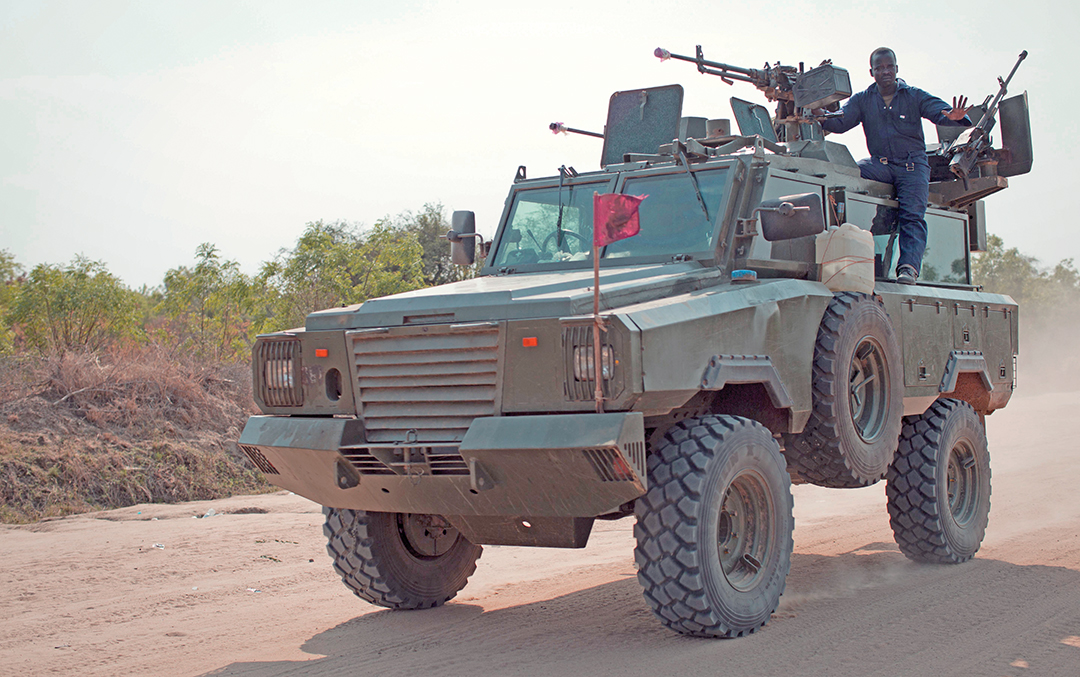Contractors can be a real asset to today’s armed forces. But military oversight must continue after the contract is signed.
ADF STAFF
Photos by THE ASSOCIATED PRESS
The core responsibilities of militaries all over the world include protecting civilians, rescue work during natural disasters and securing borders. But these same militaries must expend time and energy on the mundane tasks any large organization must deal with, such as payrolls, vehicle maintenance and laundry services.
That’s where contractors can help. They can take on the non-core functions of a military, leaving Soldiers to focus on training and peacekeeping. Jobs such as facilities and vehicle maintenance, technical training, laundry, cleaning, and food service can easily be delegated to private contractors. Such businesses often can do these jobs better and cheaper.
Modern militaries are using contractors in a variety of ways, including for consulting, threat analysis, war-gaming and simulations, software development, weapons and vehicle maintenance, the clearing of firing ranges, and computer technical support.
However, outsourcing any service or task comes with some caveats. Service quality must be maintained, and the military must exercise control over the contractor. Denis Chamberland, a specialist in global defense contracting, wrote about outsourcing for National Defense magazine. He said successful outsourcing “is about finding just the right balance of control over the contractor but in a way that allows it the flexibility to perform those tasks for which it has been entrusted.”

The military is constantly adapting to changing situations and missions and needs to adjust its contracts accordingly. Contracts need to include language requiring the contractor to work with military leaders when changes are needed.
Contractors are subject to rules and conditions that militaries never face. Armies are monopolies and are not subject to financial competition. Putting certain tasks and services up for bids to contractors encourages competition and can result in lower prices, better service and innovation. Typically, Chamberland said, competition for such services can reduce costs by about 20 percent.
Political scientists Allison Stanger and Mark Williams said it is critical for military organizations to keep a close eye on outsourcing costs. They said studies have shown that outsourcing alone, without competitive bidding, leads to disappointing cost savings. They also said contractors often get little oversight from their military bosses after contracts are signed.
Outsourcing contracts must leave no room for misinterpretation. Economists say that management procedures must be clearly defined and stated. They say military authorities often fail to provide enough qualified people to make sure the contract is maintained without cost overruns. It also is important to note that the military’s job is to oversee the contractor, not the contractor’s employees.
Outsourcing can address shortcomings that are inherent to some types of organizations. Defense Industry Daily, an online trade publication, said many governments and militaries throughout the world, including some in Africa, do not have cultures that encourage equipment maintenance and repair. In such situations, outsourcing can be the solution.

“Maintenance and support contracts may seem boring,” the publication reported. “But you can tell a lot about the readiness and state of a country’s military by watching the contracts that take place” after major equipment purchases. A military’s recognition that it needs outside help can be an indication of its professionalism.
Equipment contracts typically include provisions for maintenance, repair and overhaul; engineering support; spares inventories; and technical upgrades as needed.
Handling some maintenance contracts can be tricky. Some new weapons and military technology are so complicated, they come with contracted support staff as part of the package. And even though the contracted maintenance workers have noncombat roles, they may be needed near the field of battle. They may face the same risks as Soldiers.
“Even maintenance personnel in the rear are subject to the same risks that more forward deployed personnel will be subjected to,” a veterans advocate told CNBC. “So having contractors anywhere within a theater of operation puts them at risk of being killed or injured. And my question is whether contractors will continue to show up after the first wave may have been killed by a Scud missile or nuclear or biological weapons.”
CONTRACTORS AS PEACEKEEPERS
In recent years, contractors have been hired to augment armies’ fighting and peacekeeping forces. Countries including Angola, the Democratic Republic of the Congo, Liberia, Senegal, Sierra Leone and Sudan have hired contractors. Political scientist P.W. Singer said such contractors can be divided into three subgroups:
Military provider companies offer services on a battlefield’s front lines. They engage in actual combat, often working alongside a country’s regular armed forces. They also can provide surveillance services.
Military consulting companies offer strategic advice, training and operational services. They are similar to business management consultants.
Military support companies offer traditional support services, including maintenance, transportation and catering.
Using contractors as peacekeepers or Soldiers has several benefits, at least on paper. Such contractors allow for policy flexibility in politically sensitive areas. They can give a country more military agility; a country can hire services as needed instead of maintaining a large military. And, as with most contractors, they can reduce costs.
But outsourcing traditionally military roles can have considerable downsides. Using contractors as Soldiers or peacekeepers reduces an army’s transparency and accountability. It can encourage countermoves by other countries. Hired Soldiers can be “loose cannons,” committing criminal acts. As recent history has demonstrated, hiring civilians to do the work of Soldiers can lead to major cost overruns.
There also are some gray areas where contractors are hired to take on traditionally military tasks that do not involve combat. Armed forces in recent years have hired private contractors to fly spy missions, including over parts of Africa. As surveillance drones become more common, contractors almost certainly will be hired for training, maintenance and even piloting the devices.
Chamberland has a simple rule about when to outsource and when to keep a task in-house.
“While the main drivers behind traditional outsourcing are typically focused on the economic motivators, outsourcing military services can involve a mix of economic, political and military necessities,” he said. “The common credo of outsourcing is that non-core functions can be outsourced, while core functions — those that define the raison d’être of the organization — should never be outsourced.”

